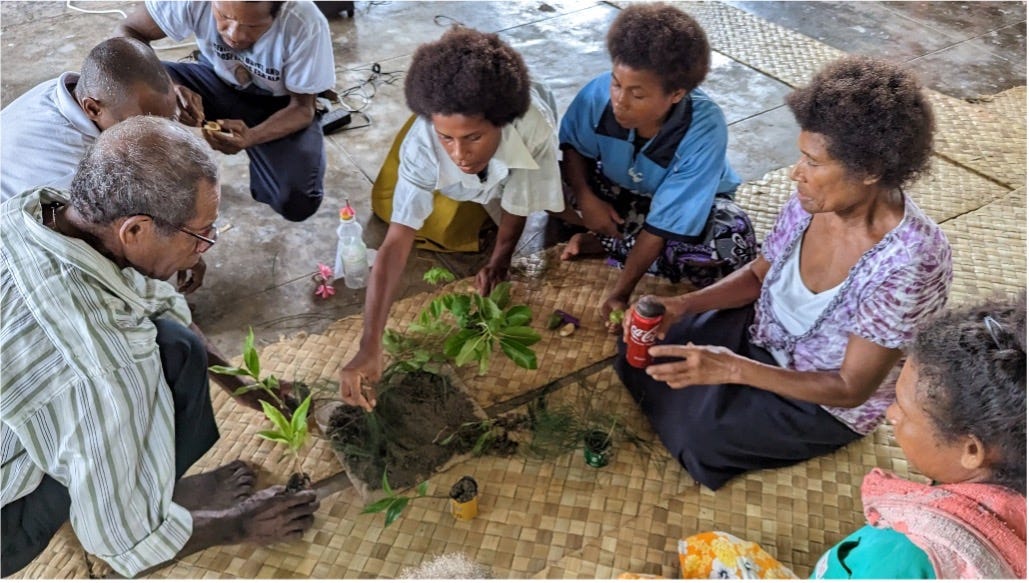Innovation Brief 4: The Impact
Stories of emerging Bible Translation in practice
This is the last in a series of four articles documenting progress and process within the Eubuone and Wanbel clusters supported by Global Partnerships. Information was compiled by the Mission Mutual Field Data Coordinator during a recent evaluation visit. For more details contact matt@missionmutual.org
Despite the challenges the local church faces in maintaining quality while utilizing an entirely local team, significant value can be found within the process itself. The process of oral internalization was powerful to watch. It was absolutely a form of scripture engagement. The SRV materials and activities used to guide the conversation could easily be used to guide a Bible study in almost any church context. The community showed a hunger for God’s word, flocking to participate in the workshop once they saw the interactive ways the team was embodying scripture. Children participating in the community review were told for the first time that they were allowed to speak in church, opening up new generations to church participation.
The model being employed was extremely effective at connecting the transformational power of God’s word to people. In some ways, it seems as if this process of translating may have as much transformational value as a completed scripture. During the translation workshop the process used to orally translate Mark 1 reinforced the church’s vision of translation as a ministry. Using resources created by SRV, the translation teams listened to succinct summaries of relevant exegetical resources, highlighting key terms, asking key questions and guiding the teams through group activities. Teams used storyboarding, random objects, and put on elaborate dramas to retell the passage. To the secretary of United Church, these activities cemented the word into people’s hearts.
“People have been reading the Bible, but now they’re trying to understand it from deep within their hearts because they are saying it out loud, so it becomes more meaningful. When they are speaking the word from their heart, in the local language, it becomes very clear for them to understand what the scriptures really mean”
To the church, this vision of individual engagement as part of translation connected the desire for a product with the desired end of transformed lives. Rev Nibo, the translation lead within the United Church Papuan Islands Region (UCPIR) put it this way,
“A classical example is what a lady has done yesterday in our debrief, a lady from Galeya. She got up and just internalized the whole scripture beforehand and when she got up, she just started from the beginning to the end without any hinderance, naturally the word just went and people were convicted and it touched people’s lives. This is how powerful this OBT tool is. The word just naturally goes out and touches people’s lives.”
By connecting the users of the Word with the process of translating the Word, an excitement surrounds the work. The first day after the Dobu community heard about the internalization process being used to translate Mark 1, a crowd of spectators, reviewers, and would-be translators filled the small church where the team was working. In the village of Alitati, where the Galeya translation was being community checked, over 100 adults and 35 children came to hear God’s word in their language for the first time.
After the children participated in community checking, one translator couldn’t help but smile.
“I didn’t expect that response from kids, their imagination. It gave me great joy. It’s worth it. Because they hear and they understand and we know it will impact their life. I’m just happy to be part of it, I’m excited, it boosts our morale to continue our work in translation.”
The process not only impacted the community generally but left the translation team with a sense of pride and agency. During a team debrief the Galeya team leader said,
“Many times, especially with visitors, we feel like they have the answers and they give them to us. But we realized that we have the answers. The answers are in us.”
Further, the team felt that translation changed how the community viewed itself.
“Before, we were ashamed to speak Galeya language, we only whispered it when others couldn’t hear. But now we can stand with our heads high. We are translating God’s Word into our language.”
The power of community ownership flows well-beyond a sense of accountability or persistence. True community-led work puts the work entirely in the community’s hands. They ask the questions and find the answers with the giftings found within their community. This process seems to entrench in people’s hearts that God’s Word not only is for them, but is also spoken through them.



